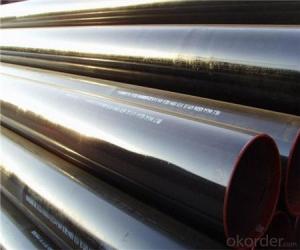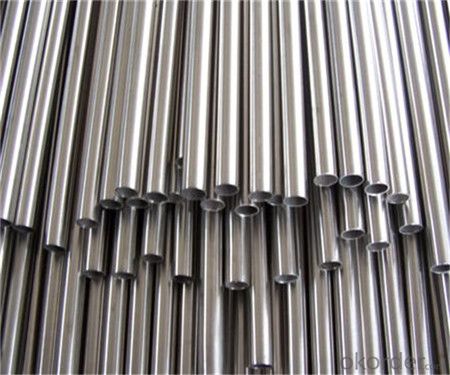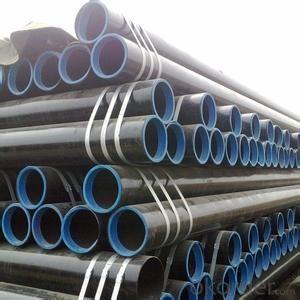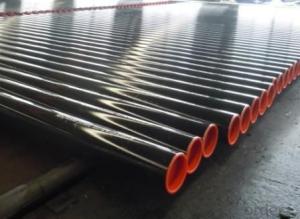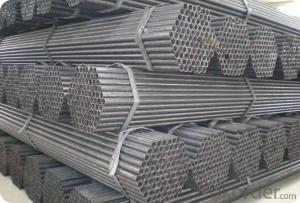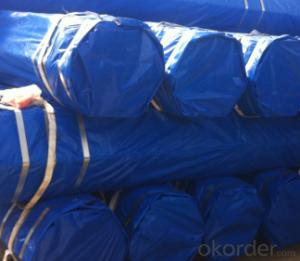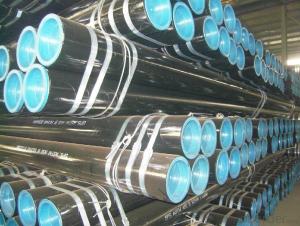Welde Steel Pipes (ERW) API5L /API5CT/ASTM A53/ASTM A500/GB9711.1/GB9711.2 anufacturer
- Loading Port:
- Tianjin
- Payment Terms:
- TT OR LC
- Min Order Qty:
- 20 m.t.
- Supply Capability:
- 12000 m.t./month
OKorder Service Pledge
OKorder Financial Service
You Might Also Like
Product Description:
ELECTRIC RESISTANCE ARC WELDED (ERW) STEEL PIPE
Standard: API 5L,API 5CT, ASTM A53, ASTM A500, GB9711.1, GB9711.2
● Application:To be used for conveying gas, water, and petroleum for oil and natural gas industries. And use
for the structural steel pipes purpose
● Main Steel Tube Grade: A, B, X42, X46, X52, X56, X60, X65, X70, J55, K55, N80-1, N80Q, M65, L80-1, C90-1,
C90-2, C95, T95-1, T95-2, P110, 9711, 9712
2、Main Features of the Seamless Pipe :
• High manufacturing accuracy
• The higher strength
• The small inertia resistance
• Strong heat dissipation ability
• Good visual effect
• Satisfy price
3、Seamless Pipe ASTM DIN1829 Specification:
Standard | GB, DIN, ASTM ASTM A106-2006, ASTM A53-2007 |
Grade | 10#-45#, 16Mn 10#, 20#, 45#, 16Mn |
Thickness | 8 - 33 mm |
Section Shape | Round |
Outer Diameter | 133 - 219 mm |
Place of Origin | Shandong, China (Mainland) |
Secondary Or Not | Non-secondary |
Application | Hydraulic Pipe |
Technique | Cold Drawn |
Certification | API |
Surface Treatment | factory state or painted black |
Special Pipe | API Pipe |
Alloy Or Not | Non-alloy |
Length | 5-12M |
Outer Diameter | 21.3-610mm |
Grade | 20#, 45#, Q345, API J55, API K55, API L80, API N80, API P110, A53B |
Standard | ASME, ASTM |
1) Material:20#(ASTM A 106/A53 GRB.API5LGRB,GB),45#,16Mn,10#.
2) Specification range:OD:21.3-610mm,WT:6-70mm,length:6-12m or according to the requirement of clients.
3) Excutive standards:GB,ASME API5L.ASTM A 106/A53,Despite of the above standards,we can also supply seamless steel pipe with standard of DIN,JIS,and so on,and also develop new products according to the requirements of our clients!
4) Surface:black lacquered,varnish coating or galvanized.
5) Ends:Beveled or square cut,plastic capped,painted.
6) Packing:bundles wrapped with strong steel strip,seaworthy packing.
4、Packaging & Delivery
Packaging Details: | seaworthy package,bundles wrapped with strong steel strip |
Delivery Detail: | 15-30days after received 30%TT |
5、FAQ of Seamless Pipe ASTM DIN1829:
①How is the quality of your products?
We have many years business experience in this area, and we have professional engineer and manager team and sure we can provide you high quality production and professional service.
②How about price?
Yes, we are factory and be able to give you lowest price below market one, and we have a policy that “ for saving time and absolutely honest business attitude, we quote as lowest as possible for any customer, and discount can be given according to quantity”,if you like bargain and factory price is not low enough as you think, just don’t waste your time.Please trust the quotation we would give you, it is professional one.
③Why should you chose us?
We can give you both.Additionally, we can also offer professional products inquiry, products knowledge train(for agents), smooth goods delivery, exellent customer solution proposals.Our service formula: good quality+good price+good service=customer’s trust
SGS test is available, customer inspection before shipping is welcome, third party inspection is no problem.
6、Seamless Pipe ASTM DIN1829 Images:
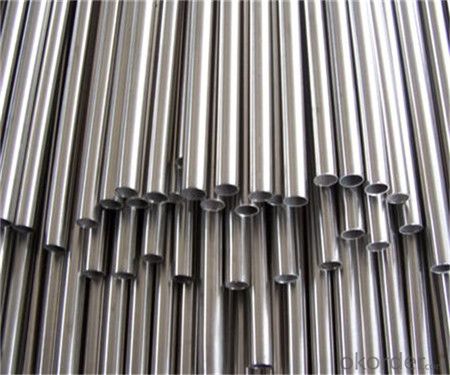
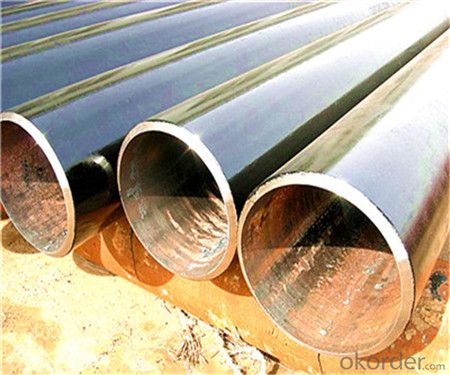
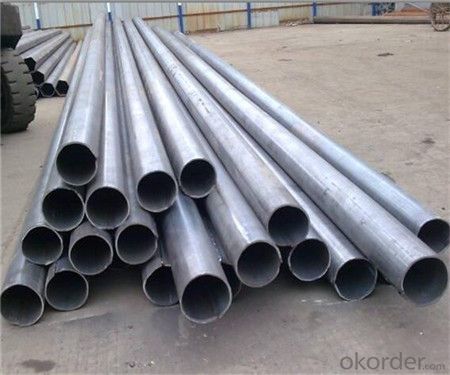
- Q: How are steel pipes tested for mechanical strength?
- Steel pipes are tested for mechanical strength through various methods such as tensile testing, hydrostatic testing, and non-destructive testing. Tensile testing involves pulling the pipe until it breaks to measure its ultimate tensile strength. Hydrostatic testing involves pressurizing the pipe with water to check its ability to withstand high internal pressures. Non-destructive testing methods like ultrasonic testing or magnetic particle inspection are also used to detect any defects or weaknesses in the pipe without causing damage. These tests ensure that steel pipes are strong enough to withstand the required mechanical stresses.
- Q: How are steel pipes used in the manufacturing of chemical processing equipment?
- Due to their durability, corrosion resistance, and ability to withstand high temperatures and pressures, steel pipes find common use in the manufacturing of chemical processing equipment. These pipes serve two primary functions within the equipment: as conduits for transporting raw materials and as channels for distributing processed products. Firstly, steel pipes safely and efficiently transport raw materials, such as chemicals and solvents, from storage tanks or external sources to various processing units within the equipment. This ensures accurate and controlled dosage and distribution. Steel pipes are chosen for this task due to their strength, which enables them to handle the high pressures and temperatures associated with chemical processing. Secondly, steel pipes distribute processed products throughout the equipment. Once raw materials have undergone chemical reactions and transformations, the resulting products must be transported to the next stage or collected for further processing. Steel pipes are ideal for this purpose as they can withstand the corrosive nature of many chemicals and the high temperatures encountered during these processes. In addition, steel pipes offer versatility and compatibility with various chemicals and solvents, making them well-suited for use in chemical processing equipment. They can be easily customized to accommodate specific requirements, such as different pipe sizes, shapes, and fittings. This flexibility allows for efficient design and installation, ensuring a seamless flow of materials and products throughout the equipment. In conclusion, steel pipes play a crucial role in the manufacturing of chemical processing equipment by providing a reliable and efficient means of transporting raw materials and distributing processed products. Their durability, corrosion resistance, and ability to withstand high temperatures and pressures make them an essential component in ensuring the safe and efficient operation of chemical processing equipment.
- Q: How are steel pipes resistant to corrosion?
- Steel pipes are resistant to corrosion due to a combination of factors. Firstly, steel pipes are often coated with a protective layer, such as zinc or epoxy, which acts as a barrier between the steel and the surrounding environment. This coating prevents moisture and other corrosive substances from coming into contact with the steel, reducing the chances of corrosion. Additionally, the composition of steel itself plays a role in its corrosion resistance. Steel is primarily made up of iron, with small amounts of other elements added to enhance its strength and durability. These elements, such as chromium and nickel, create a protective oxide layer on the surface of the steel. This oxide layer acts as a natural barrier, preventing the underlying steel from being exposed to moisture and oxygen, which are key contributors to corrosion. Furthermore, steel pipes can be treated through a process called galvanization, where a layer of zinc is applied to the surface. This zinc coating provides an extra layer of protection against corrosion, as zinc is highly resistant to rust and oxidation. The zinc sacrificially corrodes instead of the steel, further extending the lifespan of the pipe. Overall, the combination of protective coatings, the composition of steel, and galvanization processes all contribute to the corrosion resistance of steel pipes. This makes them highly durable and suitable for various applications, including plumbing, construction, and transportation of fluids and gases.
- Q: Can steel pipes be used for transporting liquids and gases?
- Yes, steel pipes can be used for transporting both liquids and gases. Steel pipes are known for their durability, strength, and resistance to corrosion, making them suitable for a wide range of applications, including the transportation of fluids and gases. They are commonly used in industries such as oil and gas, water supply, sewage systems, and chemical processing plants. Steel pipes provide a reliable and efficient means of conveying liquids and gases over long distances, ensuring the safe and efficient transportation of these substances.
- Q: How do you calculate the stress in a steel pipe?
- When calculating the stress in a steel pipe, it is necessary to take into account the steel's material properties and the external forces acting upon the pipe. The stress in the pipe is typically determined using the following equation: Stress = Force / Area Initially, the force acting on the pipe must be established. This force may stem from external loads such as pressure, weight, or mechanical forces. The force can be calculated by multiplying the pressure or weight by the surface area it acts upon. For instance, if the pipe is subjected to internal pressure, the force can be determined using the equation: Force = Pressure x Area Subsequently, the cross-sectional area of the pipe needs to be determined. The cross-sectional area of a circular pipe can be calculated using the formula: Area = π x (Diameter / 2)^2 Once the force and area have been determined, the stress can be calculated by dividing the force by the area. This calculation will yield the stress value in units like pounds per square inch (psi) or newtons per square meter (Pa). It is important to bear in mind that the stress calculation assumes that the pipe is in a state of equilibrium and that the material properties of the steel are known. The material properties, such as yield strength and ultimate tensile strength, are utilized to ensure that the calculated stress does not exceed the steel's maximum capacity.
- Q: Are steel pipes suitable for wastewater pumping stations?
- Yes, steel pipes are suitable for wastewater pumping stations. Steel pipes are known for their durability and strength, making them an excellent choice for handling the harsh conditions and high-pressure requirements of wastewater pumping stations. They have the ability to withstand the corrosive nature of wastewater and can resist damage caused by chemicals and other aggressive substances commonly found in wastewater. Additionally, steel pipes are available in various sizes and thicknesses, allowing for customization to meet the specific needs of the pumping station. Furthermore, steel pipes can be easily welded and joined together, ensuring a secure and leak-free system. Overall, steel pipes offer a reliable and long-lasting solution for wastewater pumping stations.
- Q: What are the different grades of steel used for manufacturing pipes?
- The different grades of steel used for manufacturing pipes include carbon steel, alloy steel, stainless steel, and duplex steel.
- Q: What are the environmental impacts of using steel pipes?
- The environmental impacts of using steel pipes include the extraction and processing of raw materials, which contribute to deforestation, habitat destruction, and greenhouse gas emissions. Additionally, the production of steel pipes requires significant amounts of energy and water, leading to resource depletion and pollution. However, steel pipes are durable and recyclable, reducing the need for new materials and minimizing waste. Proper management and recycling practices can help mitigate the environmental impacts associated with steel pipe usage.
- Q: How are steel pipes used in the construction of oil refineries?
- Steel pipes are extensively used in the construction of oil refineries as they are strong, durable, and resistant to corrosion. These pipes are used for various purposes such as transporting crude oil, refined products, and various chemicals within the refinery. They are also utilized in the construction of the refinery's infrastructure, including the fabrication of storage tanks, process equipment, and piping systems that connect different units and sections of the facility. Overall, steel pipes play a crucial role in maintaining the integrity and efficiency of oil refineries.
- Q: Can steel pipes be used for chimney flues?
- Yes, steel pipes can be used for chimney flues. Steel pipes are often used as a viable option for chimney flues due to their durability, heat resistance, and ability to withstand high temperatures. However, it is important to ensure that the steel pipes used are specifically designed and approved for chimney flue applications to meet safety standards and regulations.
Send your message to us
Welde Steel Pipes (ERW) API5L /API5CT/ASTM A53/ASTM A500/GB9711.1/GB9711.2 anufacturer
- Loading Port:
- Tianjin
- Payment Terms:
- TT OR LC
- Min Order Qty:
- 20 m.t.
- Supply Capability:
- 12000 m.t./month
OKorder Service Pledge
OKorder Financial Service
Similar products
Hot products
Hot Searches
Related keywords
